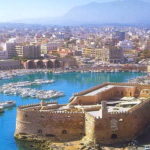Since the Syriza Party electoral victory in January 2015 the country has gone through political, social and finial upheavals not seen in recent history. Strikes, protests, public demonstrations and financial brinksmanship have unsettled the usually staid culture in that ancient country where democracy was first invented. What does all this portend for the LGBT community in Greece?
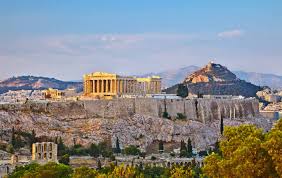
Greek LGBT Citizens Experience Hope and Courage in the After Effects of the Dramatic Election of 2015
A 2015 story about LGBT Greece was published in Slate.com written by Liam Hoare titled ‘What Syriza’s Victory Means for LGBT Right in Greece’. Syriza is a left-wing political party in Greece, founded in 2004 as a coalition of left-wing and radical left parties. It is currently the largest party in the Hellenic Parliament, with party chairman Alexis Tsipras serving as Prime Minister of Greece.
What does all this portend for the LGBT community in Greece? The changes were soon evident: “In December of that year civil unions were legalized for same-sex couples, making households headed by same-sex couples eligible for many but not all legal protections available to married opposite-sex couples, making Greece the 26th European country to adopt similar laws,” wrote Liam Hoare.
In his report based on interviews with activists and parliament members he offered wide-ranging matters that touched on many facets of Greek culture and politics. Here are his main points: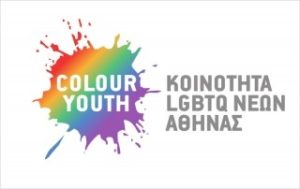
1 An emerging new generation of LGBT youth have formed in Athens an organization for young LGBTQ Greeks. Called Colour Youth coalesced from many under-40s who wanted meaningful year round activities, not just a summer Pride festival; today, as a result of their actions and words there are more than 6 organizations for young LGBTQ people mainly in Thessaloniki and Patras. “It is a colorful company of friends with a sole aim to fight sexual discrimination and inform the LGBTQ community about it rights.”
2 This has led to increased visibility, especially for people based outside Athens and for trans people. These active groups feel empowered and proud enough for direct lobbying of left-wing political parties. LGBTQ issues are no longer invisible. “We want to erase homophobia and transphobia. We invite the public to focus on these problems and start acting,” they say on their website.
3 This increased visibility has placed LGBTQ rights on the public and political agendas. During the last parliament, after much debate filled with both rancor and advocacy sexual orientation and gender identity were eventually included in the definition of hate crimes.
4 As elsewhere in Europe, there was also consequent rise in resistance to LGBT rights, in homophobic violence from far-right factions as well as intolerant individuals. Although few in actual incidents, LGBTs were the second largest target group of attacks after immigrants; in addition there was an increase in homophobic rhetoric in the Greek Parliament. Penelope Kaouni, an activist with Color Youth said “We have to fight homophobia and transphobia in schools, in police, in justice, in the public sector, in parliament and in society in general.” More.
5 To gain a majority in parliament Syriza’s formed a coalition partnership with ANEL, (a right-wing populist-indpendence faction). This was worrisome to LGBT activists but Syriza assured voters “we will not retreat as far as basic human rights are concerned.” Contrary to the fears of some, the actual truth is that a higher percentage of independent ANEL MPs voted in favor of legalizing gay partnerships than liberal-conservative political party MPs.
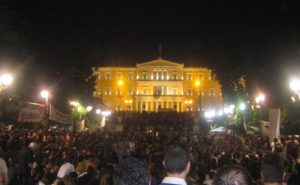 6 MP Penelope Kaouni said “For the first time, we have a government that is aware of LGBT demands, what we consider our rights to be, and why it is wrong that we are unequal. After these elections, there is hope we can achieve a lot more.” (photo left, protest at parliament)
6 MP Penelope Kaouni said “For the first time, we have a government that is aware of LGBT demands, what we consider our rights to be, and why it is wrong that we are unequal. After these elections, there is hope we can achieve a lot more.” (photo left, protest at parliament)
This major disruption of government as usual, previously much behind closed doors with one eye closed to corruption and privilege, has been necessary as well as trying for the general public not accustomed to change. The European Union has called for a halt to profligate spending, undeserved entitlements and widespread failure to pay taxes by the wealthy. As usual such stringent austerity fell heavily on the privileged and the working class who protested in the streets.
For the LGBT community, their issues might have been relegated to the third page of news reports were it not for a new generation of aggrieved youthful gay activists who have rallied the community to speak up and demand equal rights and a voice in their own destiny.
This debate is what appeared as headlines in the culture wars in Greece especially since the dramatic election of January 2015. But away from the noisy drama is a silent segment of society, middle-age and middle class LGBT whose lives have not been visibly or emotionally tormented by the political turmoil in Athens.
I have a native Greek friend who is a residential manager-owner named Antonis. Some of his friends are property owners, business owners, entrepreneurs and independent agents who weathered the political changes in a less disruptive manner.
I speak of Antonis more in the following story about Mykonos.
Mykonos is still a LGBT mecca even in the fall (2016)
Mykonos is a small island by comparison among the hundreds of other islands. It was sparked into celebrity by the arrival of Jackie O and Onassis in the seventies as they were followed by countless lesser glitterati and then by gay folks looking for a far off holiday. The island does not have any outstanding features that would otherwise attract visitors. Many other islands have equal or better geographical features, although the tiny neighboring island of Delos is close to Mykonos and became a tourist draw in the 1950s when temples and 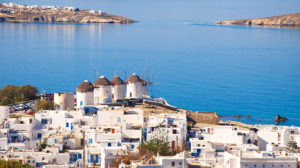 statuary were re-discovered and photographed. Today Delos is the most popular day trip out of Mykonos harbor (partly due also to the giant penis/fertility shaped carvings that are popular on post cards and tourist brochures).
statuary were re-discovered and photographed. Today Delos is the most popular day trip out of Mykonos harbor (partly due also to the giant penis/fertility shaped carvings that are popular on post cards and tourist brochures).
As tourism increased so did commerce as boutiques shops, bars, clubs, restaurants sprouted up in the village of Chora, the capital of Mykonos. Of course the rugged arid parched landscape had its own beauty and remoteness which appealed to reclusive and moneyed foreigners as well as as hard-working locals who built large and small houses in the customary white adobe style. Today there are hundreds of houses scattered all over the island, owned by Greek and foreign LGBT and straight residents and visitors. Most come in the warmer months to create the famous LGBT ’scene’ that is so pumped by the media—especially the LGBT media—as a sort of erotic paradise. (photo above, Chora town)
Party scene it is, especially in August when sun-seekers descend on the dry rocky island to entertain themselves with sun, skin, Speedos and sundown night life. “Connecting’ is a popular sport, as anywhere else in a tropical setting, including secretive visitors from the Arabian Peninsula! An annual thick glossy coffee-table magazine called ‘Mykonos’ lists all (mostly) the places to see and be seen—the dance and music halls, nude beaches, exotic hotels, gay and straight bars, trendy restaurants and fashionista clothing boutiques. However, virtually everyone wears shorts and T-shirts and sandals—nothing special about that.
Despite the July and August invasion of mostly European vacationers (each here for two weeks or less) it is NOT an endless party as many visitors—gay and straight—don’t bother much with the happening scene as is broadcast in the media and online. Even local LGBT residents often stay home or eat within their network of friends away from Chora—locals such as Antonis (photo below) who has lived in Mykonos for fift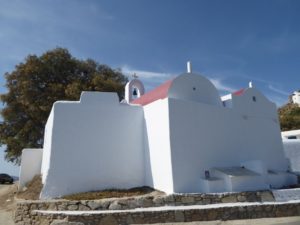 een years. He is a property manager with his husband of twenty years. “We sometimes go into town if we have friends who have never seen Mykonos and they want to see the ‘famous’ places such as Jacki O bar or Nikos restaurant… otherwise we are too busy with work to stay up late!” (See interview below.)
een years. He is a property manager with his husband of twenty years. “We sometimes go into town if we have friends who have never seen Mykonos and they want to see the ‘famous’ places such as Jacki O bar or Nikos restaurant… otherwise we are too busy with work to stay up late!” (See interview below.)
Antonis and husband have a widespread network of friends from Germany, USA, Greece and beyond, which is not unusual in modern Europe without wars, with rapid transportation, internet connections and out-and-proud LGBT communities in virtually very major city in the West. His life appears as ’normal’ as anyone’s. Following Antonis’ daily routine an observer would not guess there is anything gay about him—except possibly for his penchant for fashion watches.
Like any popular LGBT ‘ghetto’ in any worldwide country, the LGBT scene is exaggerated by the media into something spectacular. After all editors need stories and pictures to sell their publications—hard copy or online. There is no exclusive gay guidebook or gay magazine to be purchased in Chora. Most of the information is online in a dozen websites and after looking at three or four it’s obvious they simply repeat each other with nothing unique. There is ‘fun’ and sun to be had for sure but the island does not turn pink in high season. Life goes on in the bakeries (with fabulous pastries), grocery stores, cafes, art galleries, book stores and restaurants. Souvenir shops are the most changed with an increase of customers looking for fridge magnets, post cards, round glass Greek ‘evil eye’ talismans and endless paintings of white houses, windmills and pelicans.
The most lasting effect of the summer season is the general prosperity on the island. Not that everyone is upper class but there are countless summer season rentals—villas for thousands of dollar a week to modest condos—that produce healthy incomes for many owners, property managers, domestic workers, car rental agents, cooks, servers, boat owners (yachts, tour boats, ferries, fishing boats) and cigarette vendors (countless smokers live and visit here), boutique shop owners, restaurant owners and waiters (we met several seasonal waiters from neighboring Albania–photo left). Gay and straight money looks the same—all Euros, which can be had from many ATMs around the island. And here are more than a few hustlers, call boys and girls and escorts who always follow the money in the so-called world’s oldest profession (who said that!?).
Legality and HIV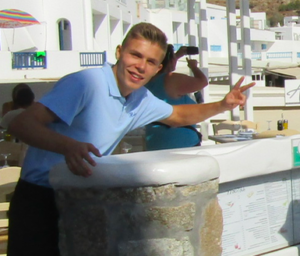
Both male and female same-sex sexual activity have been legal since 1951, long before the current ‘age of tolerance’ swept into vogue in the late 20th century. Employment anti-discrimination laws were approved in 2005. Since then anti-discrimination laws have been extended to other spheres of society, including gender identity. “Hate speech and hate crime legislation in Greece is one of the most comprehensive in Europe. In 2015, civil unions were legalized for same-sex couples, making households headed by same-sex couples eligible for many but not all legal protections available to married opposite-sex couples. Gay culture is vibrant in Greece especially in the gay neighborhood of Gazi in Athens, and in Thessalonica city and of course Mykonos. There are four gay pride parades held annually, in Athens, Thessalonica, Patras and Heraklion, capital of the island of Crete. Athens Pride 2015 attracted the President of the Greek Parliament as well as the Mayor of Athens.”
Regarding HIV and AIDS in Greece, “one of the consequences of the current financial crisis appears to be an increase in the rate of HIV infection. Struggling with a widespread debt crisis and a serious recession, many social and health services have been cut back leading to an increase in HIV, especially among injecting drug users. A needle exchange program was cancelled in 2011. Yet Greece has maintained one of the lowest rates of HIV infection in western Europe. About 12,000 people have the virus in a country of 11 million. But this is likely to change as financial and health services for the poor are abandoned; commercial sex is commonly a way of earning money for more illegal drugs.” Awareness of HIV is high in the gay community but less so in the street scene.
Despite the endemic government services labor strikes in Greece in this era of austerity a visitor to Mykonos will hardly notice these as tourist services are popular and frequented especially by people from northern countries. When its 12ºC in Stockholm it’s 22ºC in Athens.
Personal Interview with a Greek Citizen and Villa Owner, Antonis (photo right)
Antonis is the owner of Villa Drakotheo, a luxury 4 bedroom vacation rental residence where we stayed in October 2016.
RA: how old were you went you first realized you were different?
AA: I knew very young , perhaps 12 or13 already.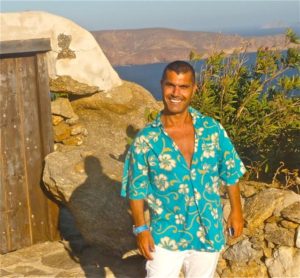
RA: what was your reaction? did you mind?
AA: I just thought I was the only one in the world but I was fine with it because I did not think it was a bad thing.
RA: did you have any unusual events that helped or hindered you?
AA: having sex when I was 14 with a much older person defined the reality of the whole thing.
RA: how much older was he?
AA: He was in his mid fifties . He was a neighbor and that’s how it started . Very gentle and nice man, very educated and sure about himself and about life. We remained friends for many years, unfortunately he is not alive any more; he passed away 10 years ago but I still remember him with warmth. To be truthful I think I was the one who went after him rather than the other way around!
RA: does your family know you are gay? their reaction?
AA: they all know….some reacted good , some bad , some scared…they all came around eventually.
RA: what’s your best feeling about being gay?
AA: I have great feelings about being human..I can not define any particular feeling as gay.
RA: what is your worst experience?
AA: No bad experiences other than usual problems as a human being— and not because I am gay…I never thought that something bad happened to me just because I am gay.
(Villa Drakothea)
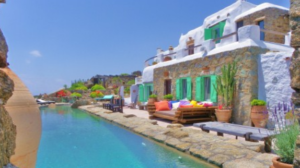 RA: how is your life today in general?
RA: how is your life today in general?
AA: lets put it this way…I would not change a thing…Perhaps some isolated moments but in general my life not.
RA: In other words, what is it like to be gay in Greece?
AA: again i can not define my problems as gay problems…or my successes as gay ones….being gay in Greece is the same as being gay in the States (since i know both cultures )…
RA: You are very generous with your replies. You speak very lovingly of your ‘mentor’ and I wish more stories could be told about caring inter-generational relationships. No doubt many young gay youths could be helped by such kindness.
Antonis’ most most recent comments are, again, upbeat: “being gay in Greece is much better than being gay in many other countries in Europe and the world. As I have stated before things are getting better all the time and although this government is bad for the economy but it’s really good for gay rights.”
Finally We Depart
The sea slides under our ship as we pass the rocks and dirt of Aegean islands peeking above the waters’ face; we forget the majority of the earth’s mass is below the water’s surface like giant icebergs that exist mostly unseen, hardly known, invisible to the human eye. So the sun goes down on another colorful season on Mykonos with its beat and beauty, its pulse and night s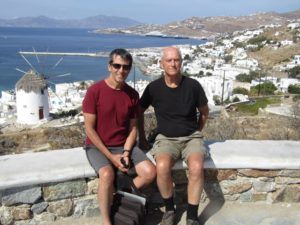 ounds, its human heat, colored lights and happy meetings; moving on. Sic transit gloria mundi—thus passes the glory of this world including this temporary erotic world. The shops and bars close as hormones flow to other venues far west and far south, indoors and less visible for the winter.
ounds, its human heat, colored lights and happy meetings; moving on. Sic transit gloria mundi—thus passes the glory of this world including this temporary erotic world. The shops and bars close as hormones flow to other venues far west and far south, indoors and less visible for the winter.
What was it that drew us hither? Sunshine? Serene quiet beaches? Party scene? My guess is that 90% of those images after the summer, remained just that—fantasies and imagination, pleasant and remote. Meanwhile the bakeries continue to sell their sweets to local residents long after the temperature cools. (Michael and Richard in Chora town, photo right)


 6 MP Penelope Kaouni said “For the first time, we have a government that is aware of LGBT demands, what we consider our rights to be, and why it is wrong that we are unequal. After these elections, there is hope we can achieve a lot more.” (photo left, protest at parliament)
6 MP Penelope Kaouni said “For the first time, we have a government that is aware of LGBT demands, what we consider our rights to be, and why it is wrong that we are unequal. After these elections, there is hope we can achieve a lot more.” (photo left, protest at parliament) ounds, its human heat, colored lights and happy meetings; moving on. Sic transit gloria mundi—thus passes the glory of this world including this temporary erotic world. The shops and bars close as hormones flow to other venues far west and far south, indoors and less visible for the winter.
ounds, its human heat, colored lights and happy meetings; moving on. Sic transit gloria mundi—thus passes the glory of this world including this temporary erotic world. The shops and bars close as hormones flow to other venues far west and far south, indoors and less visible for the winter.
 statuary were re-discovered and photographed. Today Delos is the most popular day trip out of Mykonos harbor (partly due also to the giant penis/fertility shaped carvings that are popular on post cards and tourist brochures).
statuary were re-discovered and photographed. Today Delos is the most popular day trip out of Mykonos harbor (partly due also to the giant penis/fertility shaped carvings that are popular on post cards and tourist brochures). een years. He is a property manager with his husband of twenty years. “We sometimes go into town if we have friends who have never seen Mykonos and they want to see the ‘famous’ places such as Jacki O bar or Nikos restaurant… otherwise we are too busy with work to stay up late!” (See interview below.)
een years. He is a property manager with his husband of twenty years. “We sometimes go into town if we have friends who have never seen Mykonos and they want to see the ‘famous’ places such as Jacki O bar or Nikos restaurant… otherwise we are too busy with work to stay up late!” (See interview below.)

 RA: how is your life today in general?
RA: how is your life today in general?